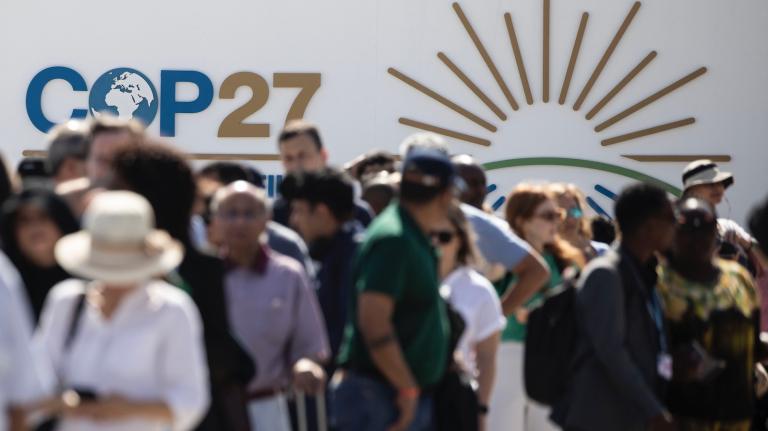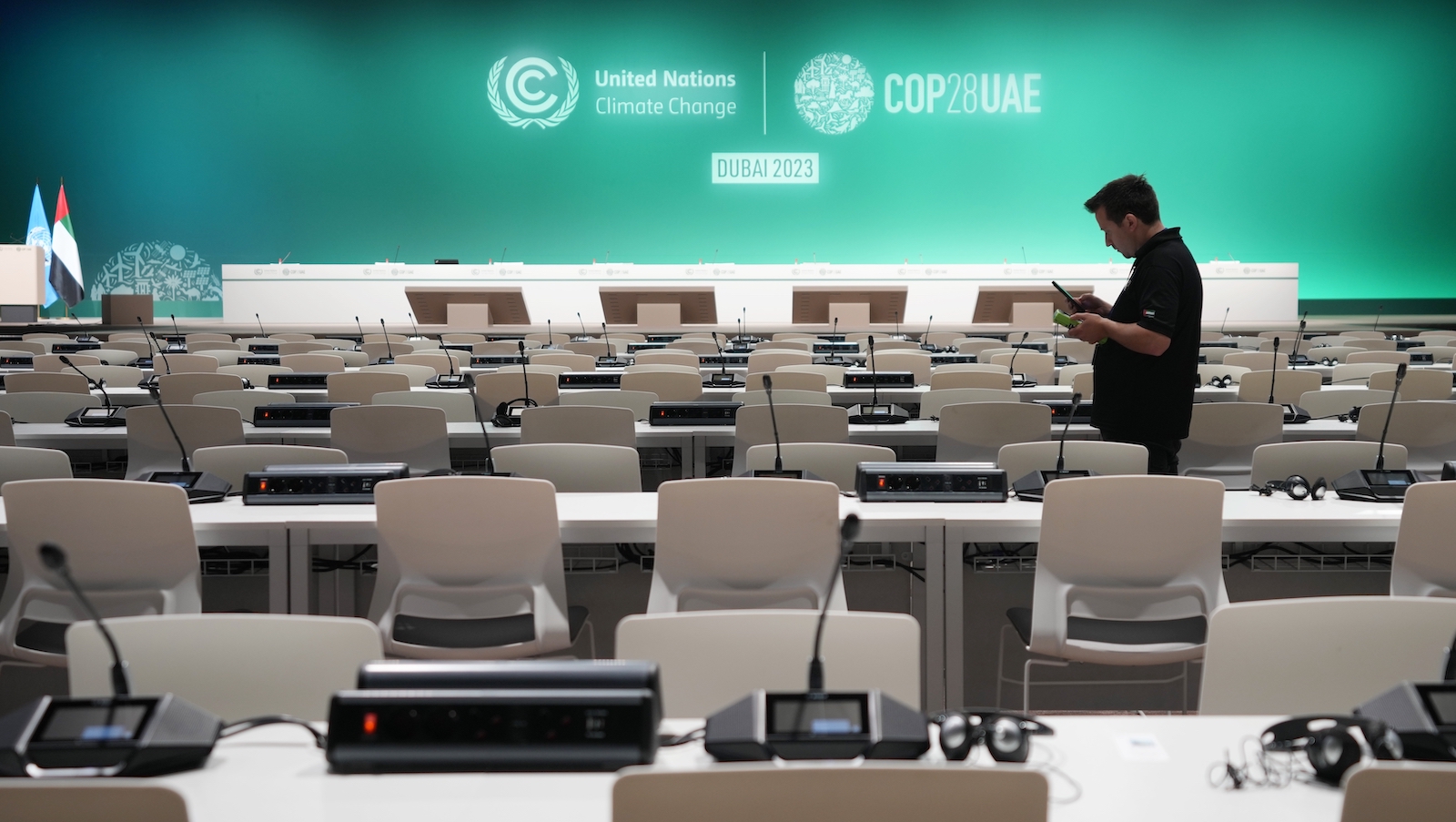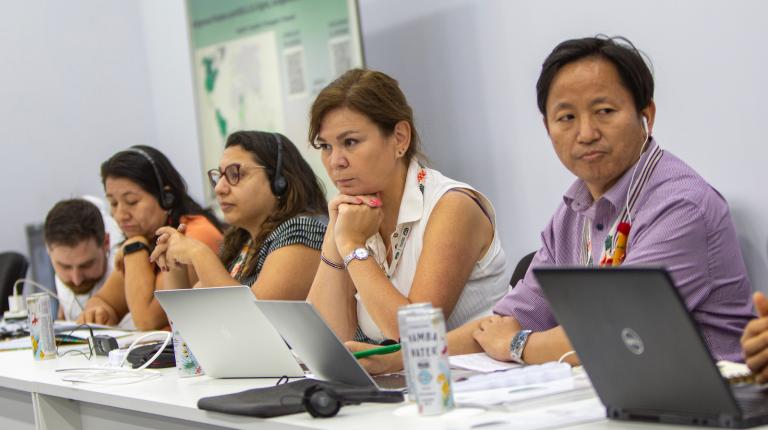Ozawa Bineshi Albert wants the world to stop relying on fossil fuels. So last year, the co-executive director of Climate Justice Alliance flew from the U.S. to Egypt to make her voice heard at COP27, the international conference on climate change where world leaders gather to negotiate new commitments to battle the climate crisis.
But at COP27, Albert, who is Anishinaabe and Yuchi, noticed that Indigenous peoples like herself were outnumbered by fossil fuel lobbyists. She was also struck by how many people touted nuclear energy as an alternative to burning oil and gas.
“Nuclear is one of the most dirty, damaging energy sources, particularly for Indigenous people,” she thought. “It touches Indigenous communities all along its life cycle from where it gets mined, to where it gets processed, to where nuclear power plants are placed, to where nuclear waste gets stored.”
That observation was just one indication of how the perspectives, and experiences, of Indigenous peoples aren’t always reflected in the broader environmental movement. As COP28 kicks off in the United Arab Emirates this week, hundreds of Indigenous advocates are making their way to Dubai with the hope of ensuring that their communities aren’t overlooked by global leaders.
Though the conference doesn’t officially begin until Thursday, the work has already started. Jennifer Tauli Corpuz is Kankanaey-Igorot from the Philippines and is managing director of policy at Nia Tero. She spent eight hours Tuesday in an auditorium with about 350 fellow members of the Indigenous Peoples Caucus, a delegation representing Native peoples, working on the details of a two-minute opening statement that the Caucus will be allowed to give during COP28’s opening ceremony. Corpuz says it’s not easy to distill everyone’s perspectives and issues into such a short statement and the work required interpreters in five languages.
Get caught up on COP28
Apart from ending fossil fuel reliance, Indigenous advocates at COP28 want to ensure that funding to offset the impacts of climate change reaches their communities; ensure Indigenous knowledge is seen as a solution to climate change; and prevent governments and private actors from violating their rights, especially as those actors pursue green energy projects.
Corpuz said the caucus plans to approve advocacy papers outlining their positions Wednesday. Then comes the work of convincing negotiators to listen. But it’s not easy.
The estimated 350 Indigenous people at COP28 is an attendance record for Native advocates, but it’s still far fewer than the 600 fossil fuel lobbyists who attended COP27 last year. As well, the most important work at the conference, negotiating the exact language of international climate change treaties, gets done behind closed doors among designated representatives from United Nations member countries.
Corpuz estimates that perhaps 20 of the 350 Indigenous people at COP28 this week have government badges that allow them access to negotiations. But even then, because they aren’t credentialed delegates representing a negotiating party, they are only able to watch and listen, not speak, she said.
Still, it’s an improvement over past years when Indigenous peoples’ representatives were locked out from even more rooms, said Corpuz. At least now Indigenous representatives will be able to hear the details of the negotiations, the perspectives of international representatives, and carry the information back for advocates to lobby government delegates. “A lot of the work of the Indigenous Caucus happens in the hallways,” Corpuz said.
A key question that’s expected to be decided this year is how much money wealthy nations like the U.S. should pay in order to cover the costs of climate disasters in the Global South, an initiative known as the loss and damage fund. One study estimates that nations in the Global North are responsible for 92 percent of excess carbon emissions each year, compared with 8 percent in the Global South.
“What’s at stake is how these finance mechanisms are going to impact and be accessible to Indigenous communities and other impacted communities, how they will be funded, and to what levels will they be funded,” Albert said. “And will those resources actually get to communities and not be taken up by agencies that will administer them?”
Eriel Deranger of the Athabasca Chipewyan First Nation in Canada and executive director of Indigenous Climate Action, thinks that it makes sense that wealthy countries would be paying for climate impacts, but Deranger also wants the money to be available to Indigenous people no matter what country they live in due to already extreme climate impacts, many of which are exacerbated by colonization and land theft.
“If Canada, for example, or the U.S. is contributing to the loss and damage fund and we don’t have access to it as Indigenous people in North America or in the Global North, where are we going to see those kind of climate reparations and restitution for the damages that we are facing from the climate crisis?” Deranger asked.
But money is only part of the equation, said Kandi White, a citizen of the Mandan, Hidatsa, and Arikara Nations in the U.S. and program director at the Indigenous Environmental Network, which sent a 25-member delegation to Dubai. “For Indigenous peoples, it’s not just about the money, but it’s also about the return of our sovereignty over our lands,” said White.
That sovereignty has been threatened by land grabs, including recent land deals between a United Arab Emirates company and five African nations for the carbon credit trade, White said. The land deals were touted as a way to help conserve land and offset pollution, but White is concerned about whether the Indigenous people living there truly consented to the plan as well as how they’ll be affected. It’s part of a broader pattern of conservation deals that are creating conflict in Indigenous territories around the world.
Both Deranger and White, who are in Dubai this week, also hope to establish a grievance procedure through which Indigenous peoples whose rights are infringed upon could hold governments accountable. “We need there to not just be lip service of, ‘We recognize Indigenous rights,’ but we need to see language that has teeth,” Deranger said.
But securing that level of accountability may be an uphill battle. Even when world leaders make promises, they don’t always fulfill them: Wealthy countries blew a 2020 deadline to spend $100 billion a year to help poorer nations cope with climate impacts and make progress toward decarbonization. One study suggested that goal may have been met last year, two years late, even as the world hurtles toward 3 degrees of warming.
The combined challenges — a lack of access to negotiating tables and tepid commitments by global leaders — have fueled disillusionment. Moñeka De Oro, who is Chamorro from the Mariana Islands and co-executive director of the Micronesia Climate Change Alliance, says that last year at COP some Indigenous Caucus members discussed boycotting the convention, “no longer being a part of these processes that continuously degrade our input,” she said.
De Oro recently helped draft a declaration for peace, unity, and climate justice in the Pacific to be read at COP that called for a future free of colonialism and militarization. But as much as she believes in that message, she joined a boycott of this year’s convention with Grassroots Global Justice Alliance protesting the Israeli government’s war on Gaza, and questions whether to attend future meetings.
“If you’re going to continue to continuously be ignored and continuously be just erased from the entire process, I don’t know how much longer we want to be complicit in attending these sorts of things,” she said.
The power imbalances can be discouraging, but Ozawa Bineshi Albert still feels determined.
“COP is not a place that we go to thinking we’re going to get everything we want,” she said. To her, the overarching question is: “How can we make sure that we at least hold the line and make sure the least amount of damage and the least amount of harm is caused to frontline and Indigenous communities?”
Editor’s note: Nia Tero is a funding partner with Grist. Funding partners have no role in Grist’s editorial decisions.




